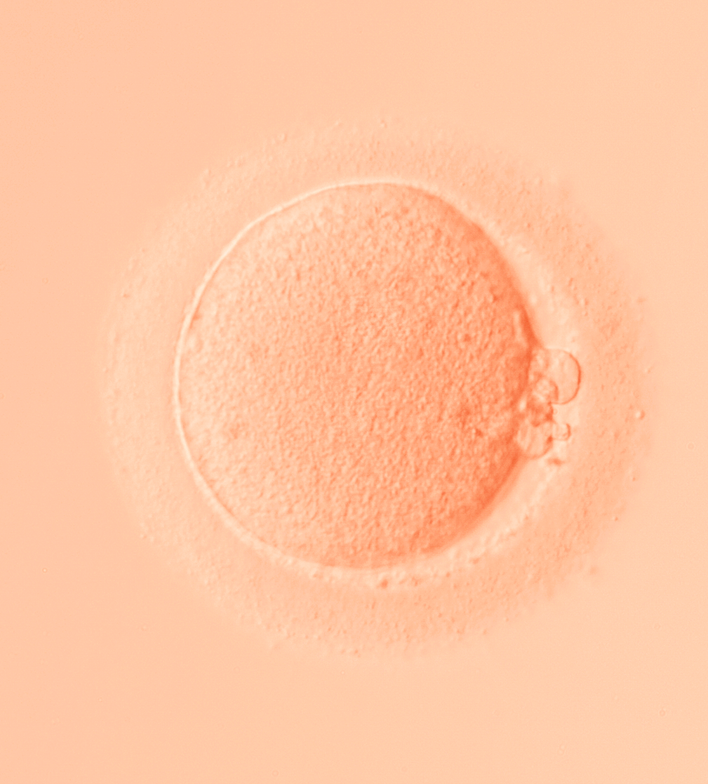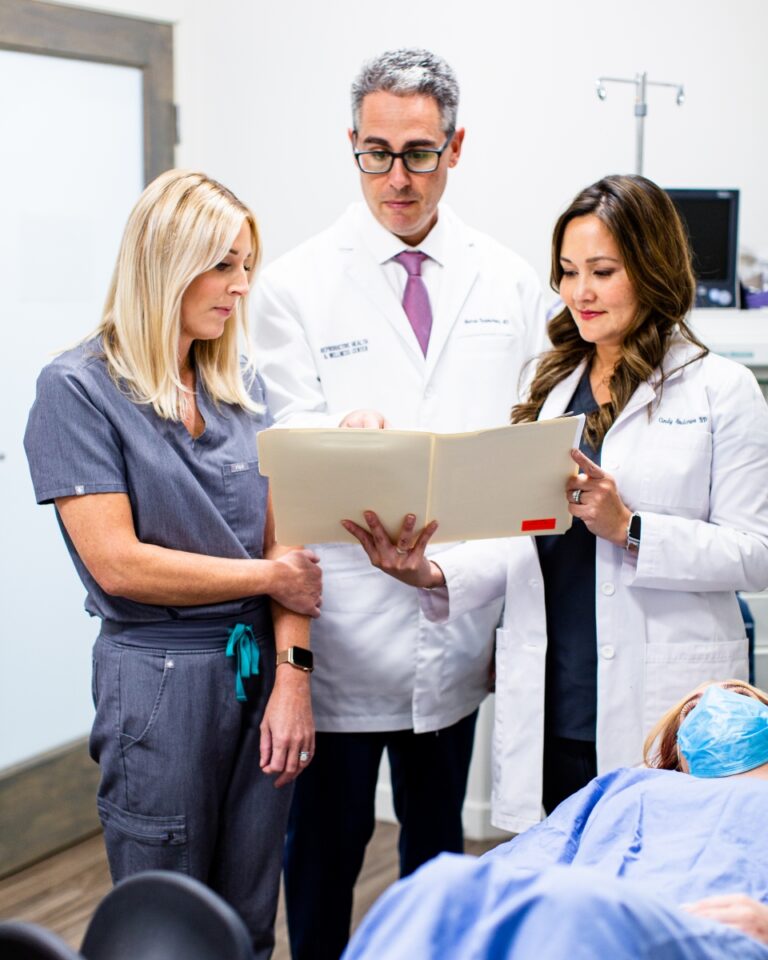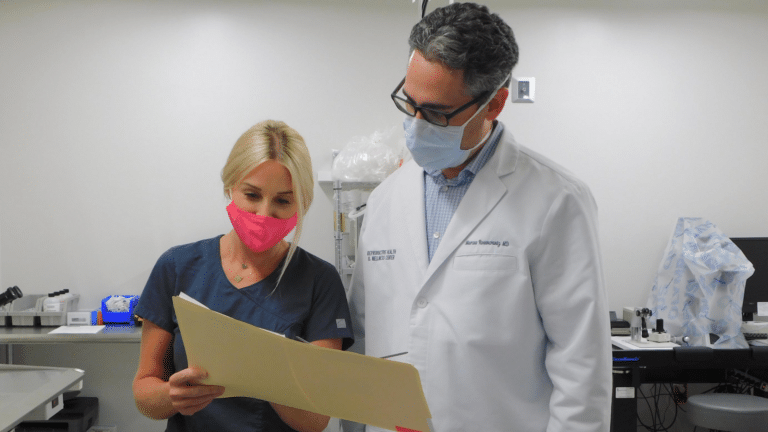WHAT IS FERTILITY PRESERVATION?
Preserving Fertility

Oocyte cryopreservation is the process of storing freshly retrieved eggs in a frozen state at a very low temperature. The extreme cold allows the eggs to stay preserved indefinitely and still function normally after they are thawed. When you decide to start your family, the eggs are thawed, fertilized and transferred into the uterus.
Egg Freezing
Overview
Since the first successful live birth from a frozen egg in 1986, egg freezing has gone through some astonishing changes. Technological advancements in fertility science make it possible for women to preserve their eggs with far greater success rates and produce healthier, full-term babies.
At RHWC, we’re Cyropreservation and IVF experts with a long history of successful pregnancies and live births. We have the experience, facilities, technology and wisdom to expertly guide you through the IVF process to a successful outcome in the shortest time possible.
Why Freeze My Eggs?

There are many reasons why a woman might decide to freeze her eggs for future use. You may simply want to extend your fertility a few more years while you work on your career goals, allow your relationship time to develop, or finish your education.
Egg freezing has also had profound impacts on women facing impeded reproduction due to surgery or illness. When faced with treatments that will permanently affect your fertility, being able to freeze your eggs beforehand gives you the opportunity to still realize your dream of a family even after losing your ability to produce eggs. You may also be facing hereditary risks, such as early menopause, that prompt you to use fertility preservation.
Egg freezing is also a great option for women facing gender reassignment surgery and allows them to still plan for biological children in the future.
Freezing your eggs while you’re still young increases your chances for a healthy baby when you’re older. Research has shown that the critical factors in a successful pregnancy have to do with the age of the egg rather than the age of the woman – the younger and healthier the egg, the better chance of a successful pregnancy.
How it Works and What I Can Expect?

The process of egg freezing is similar to a cycle of In Vitro Fertilization (IVF). Fertility drugs are administered in order to induce ovarian stimulation. This allows for the production of multiple eggs in a single cycle so they can all be retrieved at once. It’s possible for the fertility doctor to retrieve multiple eggs eggs in a single IVF procedure. The more eggs we have to work with, the greater the probability of a successful pregnancy.
When you start as a patient with us, we do a full health assessment to determine your individual needs and overall health. We also do an Ovarian Assessment, before we begin medication, to determine the potential yield of eggs we can retrieve. Based on these results, we design an individualized plan that will give you the most useful procedures and medications for your success.
During this time, all aspects of your health are closely monitored by your team and supported to produce the healthiest reproductive system and the healthiest eggs. Ultrasounds will be used to monitor the development of your follicles and pinpoint the optimum time for retrieval. This is usually 10 – 14 days after medications begin.
Take control over your family planning schedule and have greater autonomy than ever before. Egg freezing opens up many of life’s possibilities before deciding to settle down with children.
Egg Retrieval

At the optimum time for ovulation, the fertility specialist will retrieve your eggs during an in-office procedure using transvaginal ultrasound aspiration. An ultrasound probe is used as a guide to locate the follicles which are in the ovaries and are housing the mature eggs. Once located, a needle is inserted into the follicle, removing the egg.
Egg retrieval is a safe, in-office procedure with minimal risk, but some cramping, a feeling of fullness, or a feeling of pressure can occur because the ovaries are enlarged. The symptoms usually disappear once the ovaries return to normal. You can usually resume normal physical activities about a week after your procedure.
Egg Preservation

Once the eggs are retrieved, they are assessed under a microscope for their health and maturity. The mature eggs are the ones chosen for preservation.
One of the biggest challenges in freezing eggs has been in keeping the egg healthy and intact. This is because the egg contains a large amount of water, which can turn to ice crystals when frozen, destroying the egg. To address this issue, the eggs are vitrified which is the process of freezing eggs rapidly.
Vitrification freezes the eggs so rapidly that ice crystals don’t have the chance to form. The eggs are placed in a special solution, then they are placed in a container that lowers the temperature extremely fast and extremely low. This fast drop in temperature is critical to the successful preservation of the eggs. The eggs can be preserved for years, possibly indefinitely, although more research is needed to determine the exact optimum length of time in order to preserve their integrity and viability.
Using Your Frozen Eggs
When the time is right to use the eggs, a current health assessment is completed, and a course of treatment is established in order to create the most optimum conditions for pregnancy.
A few days prior to the optimal time for implantation, the eggs are placed in a warming solution and assessed. Those that survived and are still healthy are used for the procedure.
The freezing process hardens the outer membrane of the egg, making natural fertilization very difficult. The eggs are fertilized by another method, called intracytoplasmic sperm injection (ICSI), where a single, healthy sperm is injected directly into the egg using a tiny syringe.
The fertilized eggs grow in a culture base for 3 – 5 days after fertilization and are monitored closely. At this stage, they can undergo genetic and chromosomal testing, and the sex can also be determined. The embryos are then transferred into the uterus for implantation.
Egg Freezing Success Rates

The chances of becoming pregnant after implantation can now be as high as 70-80%, but since the field of egg freezing is relatively new, more data needs to be collected before we can properly assess these percentages. Research shows us that the two most important factors in a previously frozen egg leading to a successful pregnancy and a healthy baby are the woman’s age at the time of egg retrieval and the number of available eggs.
As with any IVF procedure, there is a small risk of ovarian hyperstimulation syndrome due to the use of medication. Your fertility doctor will monitor your condition closely with blood tests and ultrasounds, adjusting your medications when needed to ensure your very best health.
The available data has not shown an increased risk of any congenital conditions due to using previously frozen eggs. However, more research is needed to fully determine these statistics.
The rate of miscarriage actually goes down when younger eggs are used. Older women have higher miscarriage rates mainly due to their eggs so using eggs from when you were younger increases your chances of a healthy pregancy later in life.
When Should I Freeze My Eggs?
The best time to freeze your eggs is in your 20’s and early 30’s while you still have a strong ovarian reserve (the number of eggs in your ovaries) and while those eggs are still healthy. The older you get, the less healthy your eggs become, but each case is different and ultimately, it depends on the woman and her body, health and overall fertility.
How Many Eggs to Freeze?

Studies are showing that 75 – 85% of eggs survive the deep freeze and are viable to use. Some women can expect to harvest 10 – 20 eggs per cycle, and 10 eggs should be stored for each pregnancy attempt.
The first step is to call us and set up an appointment to see if egg freezing is right for you. We take into account your full medical history, assess your fertility, and talk with you about your goals and expectations. Together, we make an individualized plan that’s right for you.
At Reproductive Health and Wellness Center, we’re experts with a long history of performing fertility procedures that yield successful results. We have the experience, facilities, technology, and wisdom to expertly guide you through the process to facilitate your egg retrieval in the least invasive and most productive way possible. Our experts offer unparalleled support and the highest quality care. Call us to set up an appointment.
Speak with a
Fertility Specialist
What questions can we help answer today?





